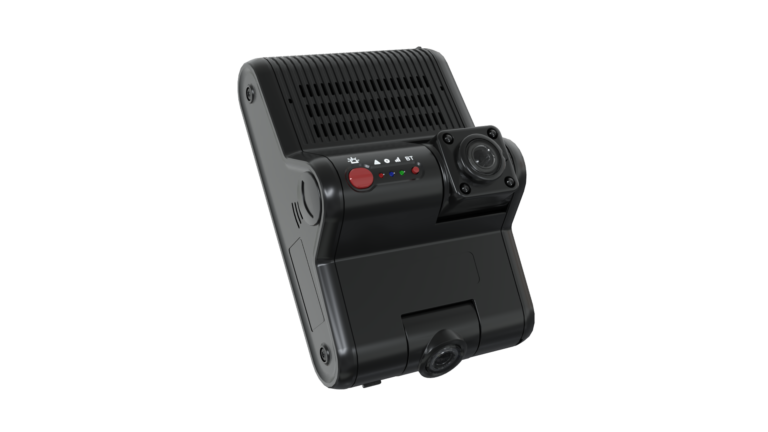
In an age where visual evidence plays a pivotal role in resolving disputes and ensuring road safety, the significance of dash cameras cannot be overstated. These devices have evolved from being mere accessories to becoming indispensable tools for commercial drivers and fleets. Check out the differences between fleet dash cameras and regular dash cameras, shedding light on their contrasts and advantages.
At its core, a dash camera serves as an impartial eyewitness, recording incidents as they unfold on the road. However, the differences between fleet dash cameras and regular dash cams, lies in their scope and purpose. While both types of cameras share the overarching goals of enhancing safety and providing accident proof, they cater to different needs. Keep reading to learn more about the two options, uncovering the differences that play a role in choosing between these two dash cameras. By understanding the differences and matching them to their fleet needs, companies can make informed decisions that raise the bar for road safety.
Fleet Dash Cameras: Features and Benefits
Fleet dash cameras stand as the leaders of road safety and operational efficiency for commercial businesses. Engineered with meticulous attention to the demands of fleet management, these cameras transcend the traditional role of incident capture.
Incorporating a suite of advanced features, fleet dash cameras redefine how businesses oversee their mobile assets. Central among these advantages is GPS tracking, which not only pinpoints vehicle locations but also aids in route optimization. Additionally, real-time video streaming provides fleet managers with instant visual insight into their operations. The ability to monitor driver behavior serves as a proactive measure to enhance safety and overall efficiency.
Unlike regular dash cameras, fleet dash cams are designed to cater to the multifaceted requirements of fleet operations. By blending technological innovation with practicality, fleet dash cameras emerge as invaluable assets, forging safer roads and streamlining business operations.
Regular Dash Cameras: Features and Benefits
As a staple for drivers, regular dash cameras incorporate simplicity and effectiveness in incident documentation. High-definition video resolution ensures clear footage, while loop recording guarantees a seamless capture process by overwriting old recordings. Impact detection is another standout feature, which automatically safeguards critical moments.
Regular dash cameras serve as cost-effective solutions, protecting businesses against liability disputes with comprehensive accident evidence. While they lack the complexity of fleet dash cameras, regular dash cameras play a crucial role in accident protection and bolstering peace of mind for drivers and managers alike.
Comparison of Key Features
Fleet dash cameras, engineered to meet the intricate demands of commercial operation, extend beyond the capabilities of regular dash cams. A lot of fleet dash cameras come with the option to add an in-cab camera. The addition of dual-lens recording captures the road ahead and inside the cab, offering a comprehensive view. Fleet dash cameras often have cloud storage to provide live-streaming video. These advanced features work to provide data security and accessibility which is crucial for fleets spread across diverse locations. Another key feature is Advanced Driver Assistance Systems (ADAS) which helps in providing real-time alerts for lane departure and other collision risks. These advanced features help take fleet dash cameras beyond the means of just a camera.
Conversely, regular dash cameras although simpler in design, cater to fleets seeking affordable options. While they lack the intricacies of fleet dash cameras, their high-resolution video provides undeniable evidence in the event of an incident.
Storage and Data Management
Storage and data management stand as defining differences between fleet dash cameras and regular dash cameras.
Fleet dash cameras, geared toward businesses with expansive operations, often have larger storage capacities. Moreover, the integration of cloud storage augments their capabilities, allowing for secure remote storage and easy retrieval of video archives. Cloud storage adds to the needs of fleet operators who often have to manage multiple points of data at once.
For fleet operators, data management can be a challenge. Efficient video retrieval, analysis, and storage demand robust systems. Regular dash cameras, while producing comparatively less footage. still require effective data handling. Regular dash cameras generally store the camera footage locally, so the only way to retrieve it is to take out the SD card and view it on a computer. These varying storage and management dynamics further differentiate the two camera categories.
Installation and Scalability
Installation complexity is another difference between the two types of cameras. Fleet dash cameras, tailored for professional use, often require professional installation as they need to be hard-wired to the vehicle. These cameras integrate seamlessly with fleet management systems, enabling real-time tracking and comprehensive data integration.
Scalability is a pivotal factor, particularly for commercial fleets that traverse extensive territories. Fleet dash cameras must accommodate larger fleets seamlessly, synchronizing the visual feed from multiple vehicles. This intricate orchestration is in stark contrast to the relatively simpler installation routines of regular dash cameras, which cater to individual installations.
Navigating the Roads Ahead: Making Informed Dash Camera Choices
There are many difference between fleet dash cameras and regular dash cameras. Understanding their unique attributes empowers users to make informed decisions. Fleet dash cameras are designed with advanced features to aid in overall fleet management. In contrast, regular dash cameras cater to affordable needs with a simpler design. Consider your individual needs when selecting a dash camera. Shop dash camera here!

